If we forget about A Goofy Movie—which I, at least, am willing to forget—the animated films that immediately followed Disney’s The Lion King had been, for want of better words, serious. Ambitious. Thoughtful. Self-consciously artistic. Filled with Serious Messages about the Color of the Wind, and Being Different. If not quite the box office triumphs that Aladdin and The Lion King had been, they did well enough to have Disney plan for three more ambitious films: a film based on the legendary Chinese warrior Hua Mulan; a technically innovative work based on Tarzan, and a second Fantasia film.
And popping up right in the middle of all of this serious, ambitious, beautifully animated work? Hercules.
A film whose approach to Greek mythology can be at best called “irreverent,” whose greatest ambition might have been to win the “Most Inside Jokes in a Disney Animated Film Ever” Award. A film that abandoned pretty much all of the ambitious animation and technical work that the previous films had focused on, the only film in the Disney Renaissance that could be said to go backwards in terms of animation development.
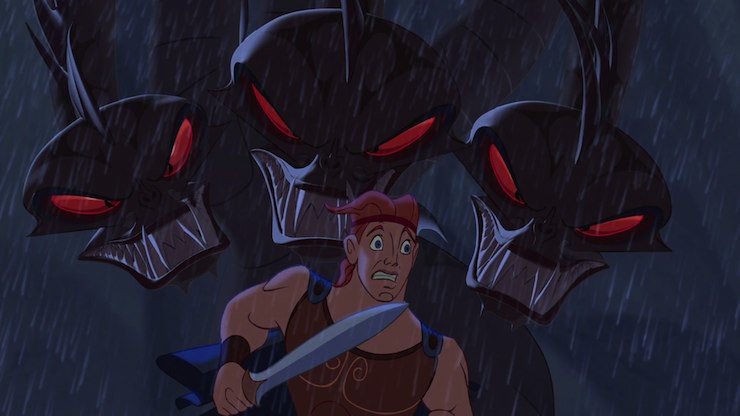
Possibly because Hercules was the first—and so far only—animated Disney film brought to life more or less because of—can we say coercion? Blackmail? When Disney executives are involved? Perhaps not. Let us instead use the not entirely accurate term “trade off.” Disney might say, “financial concerns.”
These, er, “financial concerns” dated all the way back to the mid 1980s, when then-writers/directors Ron Clements and John Musker approached Jeffrey Katzenberg, the brand new chairman of Walt Disney Pictures, with a brand new idea for a film: Treasure Island—in space! Katzenberg, alas, was no lover of pirates (fictional or, later, digital ones), and suggested that the two work on The Little Mermaid instead. When that film did well, Clements and Muskers pitched their idea again. Katzenberg, still unenthusiastic, said no, and put them to work on Aladdin. When that film did well, an undaunted Clements and Musker brought Katzenberg more drawings of their space pirates.
The intervening years had not made Katzenberg any fonder of pirates, let alone space pirates. But he finally agreed to a deal: if Clements and Musker made a silly, crowd pleasing picture—emphasis on silly and crowd pleasing—with at least one ballad that could be churned into a top 40 hit—Clements and Musker could maybe, possibly, finally have their pirates film. With just a few conditions: one, this silly, crowd pleasing film had to make money. And, Katzenberg added, since the Disney Parks and Disney stores were expanding, it would help if Hercules had a solid merchandizing aspect as well.
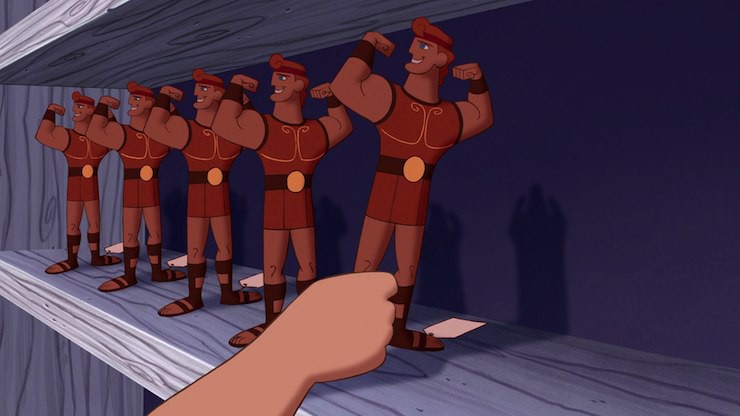
Not surprisingly, this sort of blackmailing approach meant that no one started work on Hercules with much enthusiasm, but everyone started work keeping merchandise thoughts in mind, adding not one, but three potential characters who could be turned into cute, cuddly toys, a main character who could be turned into a little toy action figure, and angular design elements that could easily be printed on clothing. The filmmakers also added two power ballads, “Go the Distance” and “I Won’t Say (I’m in Love)” just in case one failed to become the now standard Disney Top 40 hit. “Go the Distance” made it. In the end, the only merchandise element not added to Hercules was a Disney princess—but then again, Hercules was created in the years before the official launch of the Disney Princesses franchise.
Building the film towards merchandising instead of, say, story, or character, had its problems, most notably that it left animators even less interested than usual—if that was possible—in the source material. It also led animators to add a sequence to the film where the main character becomes a major celebrity, lending his image—and his handprints—to all sorts of items: sports drinks, toys, and so on. These corporate images have little to do with the film character, but they do seem to sell. Ha ha. Even the evil minions end up sipping the drinks and wearing Air-Hercs. Ha-ha. Hercules apparently uses the money from this to build his human adoptive parents a splendid new house, which is nice (buy those toys, kiddies—you’re helping Disney executives take care of their parents!) and to turn his own home and training center into a popular tourist attraction, just like certain large theme parks in two of the U.S.’s largest states. It’s amusing, if you don’t know just how the writer/directors got dragged into all this, and perhaps a bit bitter and cynical if you do, and perhaps just a few too many self-referential gags if you’re just trying to watch the film—not to mention that, just two decades later, some of the gags are already not dating well.
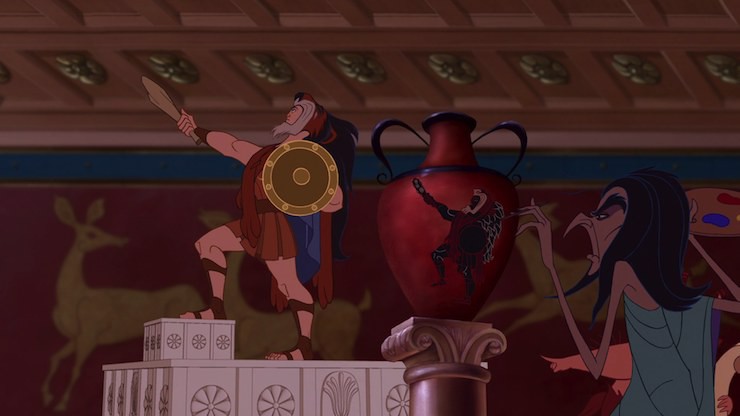
But even if animators could point to the numerous Herakles artifacts to show that people in ancient times didn’t hesitate to use the guy to sell things either (a point made by at least two Disney cast members in my hearing), a celebrity Hercules endorsing specific lines of sandals is not just not exactly part of the original myth, but almost emphasizes just how far off this representation of the main myth is from its original. Partly because, as noted, no one making the film was particularly interested in creating an “authentic” depiction of Hercules—and even if they had been, the recent attempt at “authenticity” with Pocahontas had not led to a huge blockbuster success, but also probably because somewhere along the line someone realized that a faithful representation of the main myth of Hercules, which includes insanity, child murder, trickery, a descent into hell, and a rather unpleasant side interlude involving some stables, was perhaps not really ideal Disney material. That, of course, had not stopped Disney from adapting other not really ideal Disney material, though the mixed results of that was perhaps another reason why, apart from letting Hercules do a few of the Twelve Labors during a montage, the animators threw out most of the source material.
Hercules, for instance was no longer the bastard son of Zeus—marital infidelity being one of many subjects Disney wanted to avoid—but rather the son of Zeus and Hera. Instead of sleeping with about half the people he encountered (I don’t feel I’m exaggerating much here), the film Hercules is positively chaste, falling in love once, with the first girl he meets as a trained hero, and never once looking at another girl during the entire film. This, although at one point he’s on screen with Aphrodite. Granted, it’s a blink and you’ll miss it moment, but, Aphrodite, people. And Hercules barely notices. Quite a switch from the Greek hero credited with sleeping with around one hundred or so people, depending upon which myths you believe.
Indeed, for a film supposedly based on ancient Greek mythology, Hercules has very little of it. Only a few of the Greek gods even appear in the film—Zeus, Hera (with only a few lines, and considerably kinder and more maternal than her description in the The Iliad would suggest), Hermes (far more like David Letterman’s band leader Paul Schaffer than his description in The Odyssey would suggest), and Hades (far more hilarious than any ancient text would suggest) plus the Fates, here forced to share a single eye, a trait more usually associated with the Graeae, three women from a different myth. A few other gods get very minor cameo roles or mentions—if you watch closely, you might notice Aphrodite, Athena (I think, based on the little owl), Ares, Hephaestus, Narcissus (he gets a joke), Poseidon, and someone who is either Helios or Apollo, all in non-speaking roles. But that’s about it—except five of the Nine Muses, who sing, they assure us, the “gospel” truth.
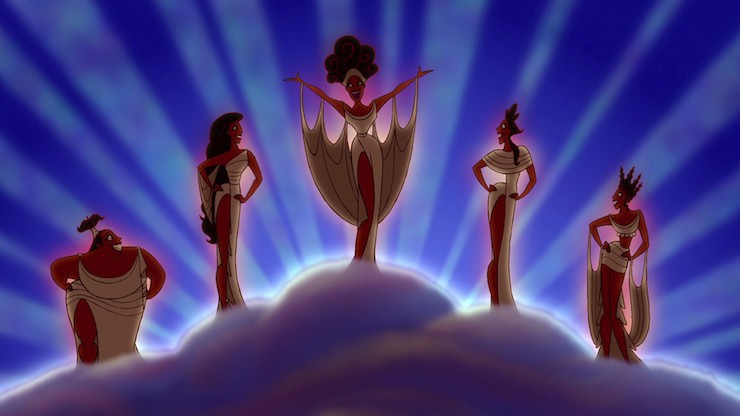
Let’s try to move past this, since, after all, the word “gospel” was originally Greek, though only after noting that the film uses the Latin “Hercules,” but the Greek “Zeus,” “Hera,” “Hades,” and “Hermes,” instead of “Jupiter,” “Juno,” “Hades,” and “Mercury.” The Greeks all use Roman numerals. Which is to say, if you’re a stickler about these sorts of things, this is not your film.
The few things that were kept: Hercules is still the son of Zeus, and still raised on earth by a mortal family, though his mortal twin brother, who barely plays a part in the original myth, is completely dropped here. He’s still unnaturally strong, although in the film, this is thanks to a touch of divinity that still remains after he almost drinks the entire potion meant to kill him. He still fights monsters. And he still descends into Hell—if this time to save someone, not to capture a terrifying dog.
And that’s about it. Instead of the story of a tortured hero, suffering from the unjust hatred of a powerful goddess, who must roam the world accomplishing impossible tasks to try to rid himself of blood guilt, it’s the by now typical Disney story of an outsider who doesn’t quite fit in, who is trying to find his place in the world. It’s the formula used in almost all of the Disney Renaissance films from The Little Mermaid to Tarzan, with varying levels of success, before getting mostly dropped in subsequent—and less financially successful—films.
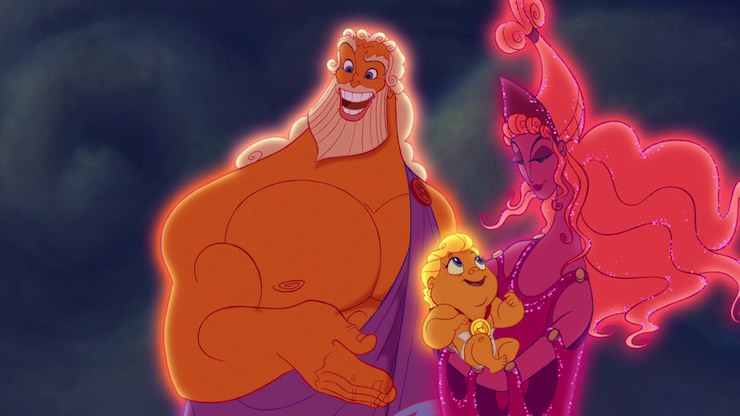
The slight difference from these other films: if Hercules fails, everything fails with him—Olympus and Earth, making this the largest stake in a Disney film yet. In comparison, if the others fail, they just doom themselves and a comparatively limited group of people. Which is just one reason why it’s rather surprising that it’s so hard for Hercules to find people willing to help him.
Hercules starts off, after all, more or less chased out of his home town, by people terrified of his superior strength and his general clumsiness. I get this, really, I do, but I also find it incredible that, given the damage he can casually cause, no one has pulled him aside and offered to help train him in control—if only to prevent future mass destruction. They don’t, of course, for plot reasons—the film needs to be able to introduce Danny DeVito at some point, but just as I typed that, I realized that plot point could have been introduced sooner as well—either by having someone realize much earlier that Hercules needed training, and thus saying something along the lines of, hmm, do we know anyone who can train heroes? Other than Phil, who is not overly good at it?
And it’s not just the home town people, either. Zeus greets his son not by, I don’t know, offering help and training, by almost immediately sending him off to Phil. (Without, I must add, warning Phil.) Phil, in his turn, isn’t particularly interested in helping out Hercules—even though by this time Hercules doesn’t just have super strength, but a flying horse—really something that ought to have encouraged Phil to start the superhero training process a bit faster. Later, Phil tells Pegasus not to help as Hercules tackles a monster, and just a few minutes later, an entire city decides to sit around and watch Hercules fight a different monster, without doing a thing to help. Which, ok, is probably the sensible response, but between this and Zeus’ “Yeah, you gotta figure out this heroism thing on your own, kid,” it all seems a little—I don’t know, callous?
And while I’m on this note, why, exactly, does Zeus send Hercules to Phil, who, according to his own admission, has failed pretty much every other hero that he’s trained? OLYMPUS IS GOING TO DIE AND EVIL WILL TAKE OVER THE WORLD IF YOU SCREW THIS UP, ZEUS. GET THE RIGHT TRAINER.
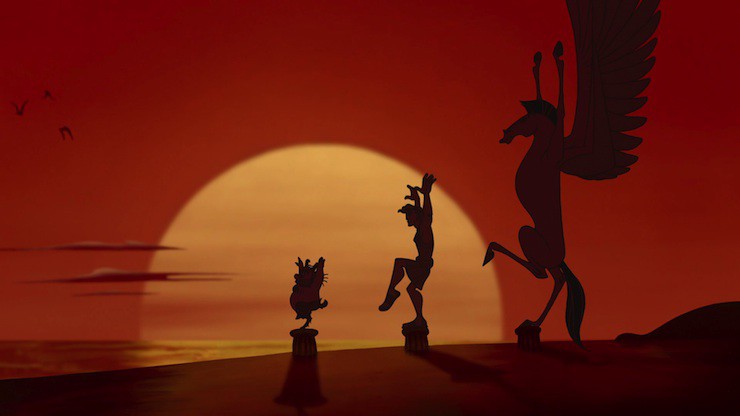
Granted, Hercules is meant to be a pretty lighthearted film, one of many reasons its comparatively high death toll is a bit surprising, even if the death toll is for the most part not all that long lasting, and Hercules does need to do at least some of his heroism on his own. But the treatment of Hercules still comes off as rather unfair, especially in a scene where Phil angrily walks out on Hercules. It’s more or less an echo of a similar scene in Aladdin, when the Genie angrily walks out (well, vanishes out) on Aladdin. But the Genie vanishes out on because Aladdin is doing two seriously wrong things: breaking a pretty important promise to the Genie, and lying about something fairly significant to numerous other characters. Hercules, on the other hand, is upset that his friend and tutor is saying mean (if truthful) things about his girlfriend. They aren’t equal sins, and having them result in equal punishment does make it feel as if Hercules is getting a rather rough deal. Which does, come to think of it, accurately reflect the original myth.
Also somewhat reflecting the original myth: it’s surprisingly sexual, especially for a film aiming for a G rating, almost from the moment that the five Muses start singing. They assure us that Hercules is hot, a feeling shared by a later group of presumably teenage girls who pursue Hercules in his home-turned-tourist-attraction. Phil spends his spare time leering at women and making various suggestive comments. Phil, granted, is a satyr, a creature associated with blatant sexuality in Greek mythology, but there’s still something a bit disconcerting about how the film has him ogling and attempting to pick up or touch nearly every woman that he comes in contact with until the very end of the film. At which point, possibly as a reward, he gets Aphrodite. It’s played for comedy, and the women have no problem tossing Phil off, but it’s still kinda creepy, if fully in the tradition of Greek mythology as envisioned by Disney all the way back to Fantasia.
Also, Pain and Panic disguise themselves as a seductive flying horse to trap Pegasus.
Which brings us to Meg.
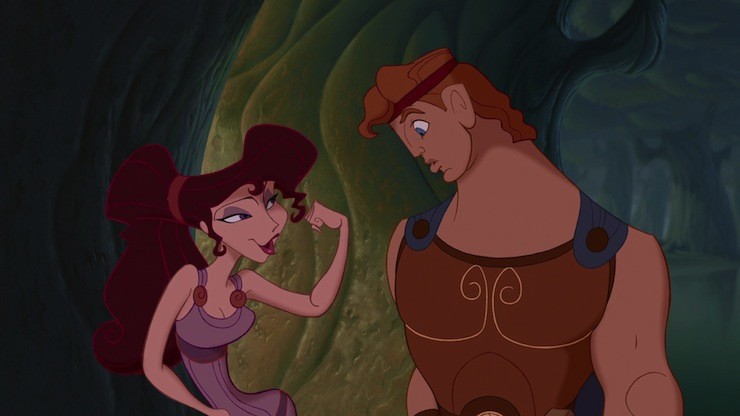
Meg occupies a rather unusual position in the Disney canon: she’s the first love interest ordered to seduce another character for nefarious purposes. Oh, she’s certainly not the first character who absolutely, positively must seduce another character—or else. The Beast will remain a Beast, for instance—and his (probably) mostly innocent servants will be forced to spend the rest of their lives, or perhaps eternity, as furniture. Or even the first character to do so under a pretense—Jasmine in Aladdin, for instance, distracts Jafar by pretending that she has fallen in love with him—giving Aladdin a moment to maybe, possibly, grab that lamp. Or—arguably—even the first to do so under the orders of the villain—Ariel in The Little Mermaid was, after all, more or less following Ursula’s instructions.
But Meg is the first Disney love interest who is seducing the protagonist with the express intent of causing him potential harm. She’s also the first Disney love interest who is working for the villain—knowingly. And—unlike every other Disney protagonist or love interest so far—Meg has fallen in love before. It went badly. That left her cynical, even bitter.
It also left her interesting. Meg is, granted, mostly a plot device in the film, used to let Hades know that Hercules is still alive (how did he not know this? Hades, you are very unobservant) and later used to remove and restore Hercules’ superstrength, before conveniently dying so that Hercules can finally—after rescuing hundreds of people (apparently) and defeating various monsters and becoming a major celebrity—become a hero. Who knew that rescuing just one girl from death was more heroic than saving hundreds more?
And if she’s used mostly as a plot device, that only slightly broken heart of gold, along with a touch of sarcasm, make her just a bit more than that—as does her decision, towards the end of the film, to smile and turn away from the man she loves—the man who has just plunged into a cold stream of dead ghosts to save her. She wishes him luck, but never once asks him to stay with her, or even seems to think that she could ask—which given what Hercules just did for her says quite a lot about her self esteem. But it also makes her one of the very few Disney protagonists willing to give up the person she loves for his sake.
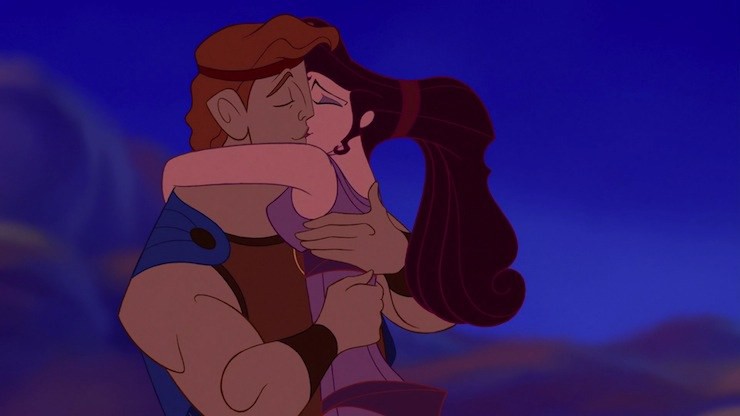
Hercules has one more surprising moment: in the end, Hercules decides to return to earth and a mortal existence with Meg, instead of finally taking his place in Olympus, as he always wanted. I’m all for this, despite the multiple questions it creates, such as, if Zeus can so easily make Hercules no longer mortal, why couldn’t he do this to Hades earlier? Or did Zeus just not realize the threat? And since Hercules became a nice glowing godly hero able to ride clouds after plunging into Hades and death to save Meg, why exactly can’t Meg become a nice glowing godly heroine, given that she only died to save Hercules—and that her injury and death in that self-sacrificing moment was the key to restoring Hercules’ strength—and thus saving Olympus and the entire world?
But Hercules is not the sort of film that wants to ask questions like that. It’s silly, it’s bright, it has some rather questionable parental relationships, many of the jokes are already starting to get a bit dated, the protagonist is one of Disney’s blandest, and I’m not really sure that sending Hades down to the depths of his own realms is a permanent solution. On the other hand, it also has James Woods playing Hades and having the time of his life. He loved the role so much that he insisted on voicing the part in all later Hercules material, to the despair and irritation of animators who had difficulties animating his rapid speech patterns. Hades has little if anything in common with the god depicted in most Greek myths, but his despair over his underlings is marvelous, and he’s a lot of fun to watch. And if the bright, angular animation was somewhat—ok, more than somewhat—at odds with every other film in the Disney Renaissance, it does help the film pop out from the other films of the decade. It’s a cartoon, and in that, it stretches right back to Disney’s roots.
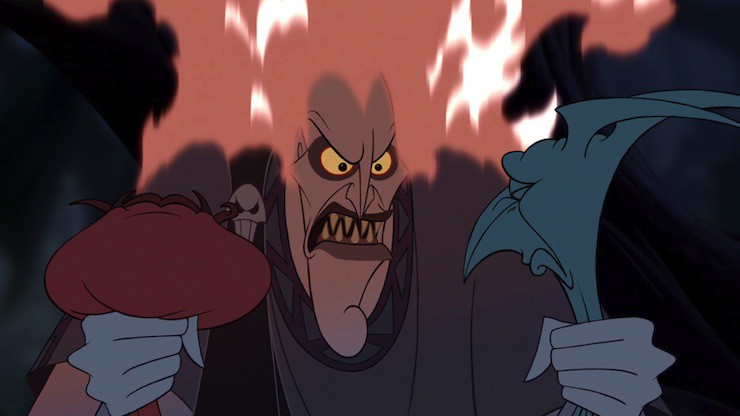
Hercules did well at the box office, and spawned both a direct-to-video prequel and an animated series that despite contradicting a rather central part of the film’s plot, did well enough to run for two seasons, with James Woods reprising his role as Hades out of pure love for the part. It was just successful enough to finally—finally—let John Musker and Ron Clements plunge ahead with their pirates in space film.
But first, Disney had a few more films to focus on. Serious films. Films that would once again stretch the boundaries of animation. And films that would move out of Disney’s familiar territories and head into South America (sorta) and Asia (even more sorta.)
Mulan, coming up next.
Mari Ness lives in central Florida.










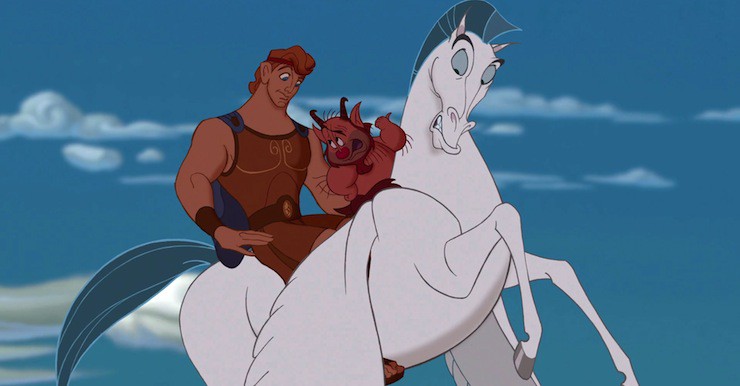
So basically this is the film that makes you long for Ray Harryhausen’s respectful treatment of the original Greek myths.
No comment on the annoying conflation of Hades with Satan? The Hades of myth wasn’t the fiery, evil lord of Hell, he was the just ruler of the entire afterlife, good, bad, and neutral. In fact, as one of the Dresden Files novels pointed out, Hades was just about the least ill-behaved god on Olympus, with relatively few claims to infamy compared to his relatives. And yet, because prudish folks a few centuries back decided to use “Hades” as a euphemism for “Hell,” Americans tend to confuse the two. And so we get portrayals of Hades as a “devil” in stories like this and the final season of Lost Girl (with Eric Roberts as a really sleazy and evil Hades).
I just laugh my way through this movie. The jokes are very funny to me, the historic references, the linguistic joke, I love it all.
Meg and Hades are part of what make Hercules so good. The cheesiness of it all works, the irreverence works, the animation, you’re right, isn’t great, but it is different, and that’s good too.
I can handle the historical inaccuracies for a light-hearted cheese film. And catchy music.
If I turn off the part of my brain that knows a lot about ancient Greece and Greek myth, I can enjoy this film. It’s been ages since I’ve seen it, but I did like the hero = sports star thing and I really liked the way they based character designs on vase art. OTOH, the muses are pretty much stolen directly from Little Shop of Horrors.
(Small quibble: “gospel” is not derived from the Greek. It’s Old or Middle English “good spell” in the sense of “good story” or “good news”. All the words with an “evangel-” root (of which “gospel” is an indirect translation) are Greek.)
OTOH, Little Shop of Horrors not only “stole” the concept of using a chorus in a pitch-black comedy/tragedy but actually managed to pull it off for a modern audience, so I’m not going to have fits about the same chorus coming back to basically sing the Theogony in gospel/Motown. Interrupting the Pedantic Classicist (my personal name for the fake-out narrator) in order to do so. Honestly I really enjoy this film without even having to put effort into turning off my knowledge of ancient Greece, and it’s mostly because its anti-pedantry is so cheerfully, in-your-face shameless.
@5 — Anti-pedantry? I like that term. And yes, the movie’s mainly a comedy. At least I remember it being one. Doesn’t have to be accurate, just funny.
Look, I love this movie, I love the music (I have I Won’t Say (I’m In Love) on my playlist and probably listen to it at least once a week), I love Meg and I love the Muses. At the time I was nerdy enough to be somewhat familiar with Roman and Greek myth and able to pick out the inconsistencies, but honestly, I don’t care so much about the differences, because when I watch a Disney movie, I want something fun, funny, with good music, some romance that is perhaps inspired by a story but is giving it a new take. And since I think they pulled off the story they DID tell, I’m not going to get upset that it’s not a perfect portrayal of Greek myth.
I agree with CLB that possibly the most irritating thing is the Hades/Satan conflation but again…James Wood did such a great job with the role it’s hard to begrudge it…
This sent me off to IMDB to double-check, and, yup, James Woods appears to have done the Hades voice-acting for all the Kingdom Hearts games (or at least the ones I bothered to check, and the ones in which Hades appeared and was voiced) as well. Which is both dedication to the role and an explanation for why Hades is often the most interesting sub-villain in those games, when he comes up. Apparently enthusiastic voice acting can go a long way towards salvaging some mediocre writing.
Oh, and I remember watching the movie when it came out! At the time, I considered it fun but very forgettable (aside from, again, Hades). But the fun part was when after a particularly grueling section on Greek mythology in an AP Language class, the teacher gave us a treat: two class sessions of just watching this movie. We were told to list every reference to actual Greek mythology that we caught, and got extra credit for coming up with enough. Especially if we could explain where the movie had changed things. Good times, even if it resulted in a lot of very frantic writing during the opening scene with all the gods.
@2/Christopher: Saint Seiya portrayed Hades as the lord of the afterlife. Of course, that didn’t keep the producers from depicting him as the definitive end-point villain of the entire anime.
And in the original manga, as well. Forgot to add.
“The women have no problem tossing Phil off”… wrote someone clearly unfamiliar with British vernacular ?
Hold up… why all the shade for A Goofy Movie?!?! I love that film!
I remember when this came out. McDonalds or Burger King (I forgot which) had bathrooms for “Greek gods” and “Greek goddesses” and plates with characters saying food-related things. (Now the merchandising in the film feels rather meta). I saw some previews, considered Hades to be the Genie’s cousin, and later watched a bit of the TV series. But I first watched the film just a few years ago, as an adult, and its particular goofiness didn’t amuse me much. Especially Pain and Panic being the most pathetic anthropomorphic personifications I’d ever seen. And I wouldn’t have given it a G rating.
As far as I know, Meg is the only Disney heroine ever to fall in love more than once, or to have been in a relationship before meeting her True Love. This probably makes her more relatable to many adults. I appreciate that, and wish Disney had noticed.
This is one of my favorite Disney films of all time. Folks may have been coerced into doing it, but once they got into it, they obviously decided that their whole goal was to have fun. Nothing was sacred, and the characters were great. The whole sequence mocking merchandising was absolutely hilarious. Herc may have been a bit on the dull side, but I thought that Meg was one of the most interesting female characters that had showed up in a Disney movie. I remember finding and buying a complete set of all the PVC figures from the movie to put on the shelf of my den. And then, a few years ago, my granddaughter got old enough to watch Disney films on DVD, and she fell in love with the film. So I gave her all the little figures to play with, and I couldn’t have made her happier. Her name is Meg, and she was enthralled with the fact that the heroine of the movie shared her name.
We live in RI, where James Woods is from, and in the summer, we often see him at the place where we eat breakfast on weekends. I remember pointing him out to my granddaughter one morning and explaining that he was the voice of Hades. But that was a few years ago, and she got confused–I think she was a bit too young to understand that there were humans involved behind the scenes to create those cartoon characters on the screen.
@13: I have those plates at home – or rather had; Pegasus’ cracked and the rest (Phil, Zeus, Megara, and both Hercules plates) were handed down to some relative or other.
I think this film is SO irreverent that I can watch it without being annoyed at how very far from the original myths it went. If it had been trying to take itself seriously I think that wouldn’t have worked.
As far as I understood it, Zeus couldn’t just turn Hercules back into a god – there are rules even he must follow. Hercules had lost his godhood, except for one drop’s worth – so all his hero-ing was meant to build that back up – but most of the tasks the movie shows are him going to seek out some monster to slay. A valuable act for the people being harassed by the monster, but not the same act of utter selflessness that finally tipped the scale in his favor.
Actually, by that logic, I’m not sure that he would have been able to take that last step if it weren’t for Hades having taken his strength.
Basically, Herc was able to return to being a god because he was already supposed to be a god. Despite Meg’s cynicism about everyone being petty, there are surely plenty of selfless acts like hers at the end – but that doesn’t mean every one of them becomes a god.
Somewhere out there in the wilds of the Interwebs there is a fan-written sequel in which the youngest goddess, Persephone, discovers that she is destined to be married to Helios, who is as vain as a peacock and boring besides, and runs all the way to Hades to get away from him and her overbearing mother. Springtime has come to Hades’ realm, but Hades ain’t happy about it. Meanwhile, she is less than impressed by his attempt to escape his assigned role of third-rate hanger-on by kicking everything down in the first movie. While they are having a comic battle complete with musical numbers, the other gods are busy convincing themselves that Hades kidnapped Persephone. But by the time the rescue force has assembled, the two of them have had a meeting of the minds, followed shortly by a meeting of the bodies, and then Persephone gets to tell off Helios. We end with a look at the newly renovated realm of Hades, with Elysian Fields, comfortable waiting rooms, and cheerful tour guides (Pain and Panic), one of whom is in a barely-skirting-PG-13 happy kinky relationship with another demon.
I really need to find that fic again. A lot of the scenes were paced and described so like the movie that I could see them in my head. And James Woods could have had a lot of fun with the lines.
Welp, I found it.
So did the Suck Fairy. Drat.
What, they didn’t include the Augean’ stables? That’s one of the few labours that are not about killing or capturing monsters, a rare example of Heracles actually thinking!
it gets mentioned in the scene where Herc is posing in Scar’s skin. Phil is giving him at itinerary and says ‘you’ve got an appointment with a guy named Augeus. He’s got a problem with his stables.’
@18 Jenny Islander, would you link me, please? I’m curious now — even if the Suck Fairy dydst putte a curse upon it.
Was I the only person who found the whole bit with baby Hercules falling from the sky and being adopted by a kindly farming couple familiar from an entirely different heroic myth?
@12 Agreed! A Goofy Movie is great!
When it comes to inconsistencies with the source legends, I like to compare this film with the contemporaneous Hercules/Xena TV shows. There, the difference between Kevin Sorbo’s thoughtful, intelligent Hercules and the “Butthead of Olympus” impression you might get from reading Bulfinch or Hamilton is attributed to his legend getting distorted in the retelling.
This theory is wonderfully played with in a Xena episode where Gabrielle enters a bardic contest. Her tales of Hercules and Xena-both of whom she knows personally-are represented by stock footage from earlier episodes, and are mostly dismissed by her competitors. The other bards’ tales are clips from old Sword-And-Sandal films in the Steve Reeves vein -cheesy, cheaply produced, and with a hero who’s all brawn and no brain.
Amusingly, the bardic contest is eventually won by a young Homer, who tells the story of — wait for it — Spartacus, the storytelling represented by clips from the classic Kirk Douglas film. (Well, it figures the blind bard would have better production values…)
Yes, in one of the most magnificent anachronisms in living memory, an Ancient Greek tells the story of a Roman slave rebellion that won’t occur for a millennium and a half. Now that’s entertainment!
I remember someone asking why, if they wanted to call Hercules by his Roman name, they didn’t do the same for the gods. Someone joked in reply that it was because Hades would have to be called “Pluto.” I guess they could have called him Dis Pater, but that name isn’t that familiar these days. I think it’s mostly just because the name Hercules is such a significant part of popular culture that Disney making a movie called “Herakles” would just confuse people. Even Rick Riordan, who usually sticks pretty closely to the original myths, tends to have his characters who are familiar with the gods’ Greek personifications call the hero Hercules.
I wonder why they didn’t cast Paul Schaffer as Apollo, seeing as how he was the god most associated with music. Then again, Hermes did invent the lyre.
I haven’t watched this one for years (I refuse to use Disney+, for politics) but I love the character designs an general animation of this one. So sharp and so unique.
And using gospel is such an inspired choice for me, personally. We could always use more Gospel in movies!!